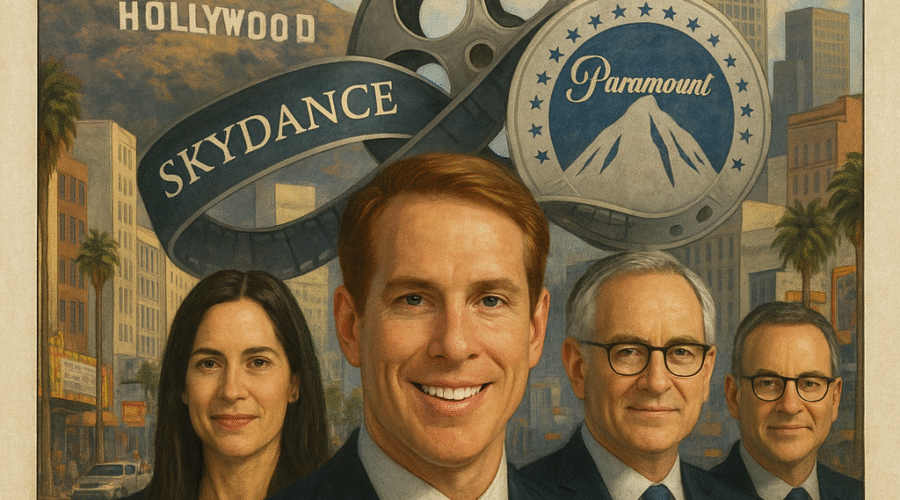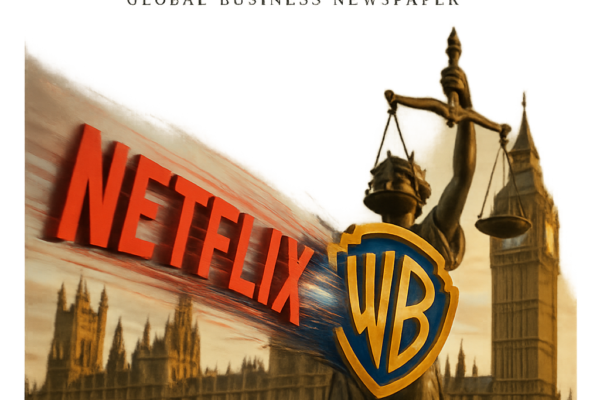The completion of Skydance Media’s transformative $8.4 billion acquisition of Paramount Global on August 7, 2025, marks a defining moment in Hollywood’s ongoing consolidation, with CEO David Ellison unveiling a carefully curated leadership team that signals ambitious plans to revitalize one of entertainment’s most storied franchises. The newly formed Paramount Skydance Corporation, trading under ticker symbol “PSKY” on NASDAQ, represents a strategic bet on combining traditional media assets with cutting-edge technology capabilities, positioning the combined entity to compete more effectively in an increasingly fragmented streaming landscape.
💼 M&A / PE diligence in 24 hours? Yes, thanks to AI!
Executive Leadership Architecture Signals Strategic Transformation
David Ellison’s selection of former NBCUniversal CEO Jeff Shell as President represents perhaps the most significant executive appointment in the post-merger landscape, bringing proven operational expertise to oversee day-to-day operations across the company’s diversified media portfolio[1][2]. Shell’s appointment comes despite his controversial departure from NBCUniversal in April 2023 following an investigation into an inappropriate relationship with CNBC anchor Hadley Gamble, demonstrating Ellison’s willingness to prioritize operational competence over reputational concerns in pursuit of turnaround success[8]. The decision to install Shell, who spent 19 years at NBCUniversal and led the company through the challenging streaming transition period, reflects Ellison’s recognition that traditional media experience remains critical for navigating the complex broadcast and cable television ecosystem that generates substantial cash flow for Paramount’s operations.
The leadership structure announced on August 4, 2025, reveals a decentralized organizational model designed to empower division heads with considerable autonomy while maintaining strategic alignment under Ellison’s vision[3][4]. This approach reflects lessons learned from other media conglomerates where centralized decision-making has often slowed creative processes and reduced competitiveness in rapidly evolving entertainment markets. The appointment of Andy Gordon, a RedBird Capital partner and former Goldman Sachs managing director with 35 years of investment banking experience, as Chief Operating Officer and Chief Strategy Officer, underscores the private equity influence in the new organizational structure[6][9]. Gordon’s deep relationships in media and telecommunications investment banking, combined with his role in establishing RedBird’s Los Angeles office, positions him as a key architect of the company’s capital allocation and strategic growth initiatives.
The retention of George Cheeks as Chair of TV Media represents strategic continuity for Paramount’s most stable revenue-generating assets, including the CBS television network, which has maintained its position as America’s most-watched network for 16 consecutive years[6][14]. Cheeks’ expanded role overseeing cable properties such as MTV, Comedy Central, Nickelodeon, and BET reflects the new leadership’s recognition that linear television, despite secular decline trends, continues to generate substantial cash flows that fund content investments and debt service obligations. His experience transforming CBS from a singular broadcast network to a global content provider positions him well to optimize the traditional media assets during the company’s transition period.
Streaming Leadership Bet on Netflix Veteran Cindy Holland
The appointment of Cindy Holland as Chair of Direct-to-Consumer represents perhaps the most strategically consequential hire in Ellison’s leadership team, given the critical importance of streaming success to the company’s long-term viability[5][6][13]. Holland’s 18-year tenure at Netflix, where she served as VP for Original Content and helped launch transformative series including “House of Cards,” “Orange Is the New Black,” and “Stranger Things,” provides the new Paramount with proven expertise in scaling streaming platforms and developing culturally resonant original content. Her abrupt departure from Netflix in 2020 following internal restructuring created an opportunity for Paramount to acquire a senior executive with intimate knowledge of streaming platform economics and content strategy at a time when the company desperately needs to accelerate Paramount+ growth.
Holland’s mandate to oversee both Paramount+ and the free ad-supported streaming service Pluto TV reflects the company’s recognition that different streaming models serve distinct consumer segments and advertising markets[13]. Industry analysts estimate that Paramount+ currently maintains approximately 78 million subscribers globally, significantly trailing market leaders Disney+ and HBO Max, while Pluto TV’s free ad-supported model generates revenue through traditional advertising sales that complement subscription income streams. Holland’s experience negotiating high-profile talent deals, including the $100 million Shonda Rhimes agreement that produced “Bridgerton,” will be critical as Paramount competes for premium content creators in an increasingly expensive talent marketplace.
The strategic importance of Holland’s role becomes apparent when considering Paramount’s significant streaming investments and the platform’s need for differentiated programming that can drive subscriber acquisition and retention. Her influence on renewal decisions for premium series like Showtime’s “Yellowjackets” even before her official appointment demonstrates the immediate impact expected from her content expertise[13]. The challenge facing Holland involves balancing creative ambition with cost discipline, as the new Paramount faces pressure to implement $2 billion in operating cost reductions while investing in content that can compete with Netflix’s $15 billion annual content budget and Disney’s franchise-driven streaming strategy.
Studio Leadership Combines Creative Vision with Commercial Discipline
The co-chair structure for Paramount Pictures, featuring Skydance veteran Dana Goldberg alongside former Sony Pictures executive Josh Greenstein, reflects Ellison’s strategy of balancing creative continuity with fresh commercial perspective[4][6][10]. Goldberg, who has worked with Ellison for nearly 15 years and served as Skydance’s Chief Creative Officer, brings deep institutional knowledge of the film development and production processes that have generated nearly $10 billion in global box office revenue for Skydance properties. Her oversight of blockbuster franchises including “Top Gun: Maverick,” which earned six Academy Award nominations including Best Picture, and the “Mission: Impossible” series, demonstrates proven ability to manage large-scale tentpole productions that drive theatrical revenue and streaming platform value.
Greenstein’s return to Paramount, where he previously served as marketing president before joining Sony Pictures in 2014, brings contemporary distribution and marketing expertise gained during his tenure overseeing Sony’s motion pictures division[6]. His experience launching films in an increasingly complex distribution landscape that spans theatrical releases, premium video-on-demand, and streaming platforms will be critical as Paramount navigates post-pandemic audience behaviors and evolving revenue windows. The collaborative leadership model between Goldberg and Greenstein reflects industry recognition that successful film studios must balance creative risk-taking with commercial discipline, particularly given the escalating costs of tentpole productions and the reduced predictability of theatrical box office performance.
The expanded scope of Goldberg’s responsibilities, including oversight of Paramount Television Studios and Nickelodeon Films, reflects the integrated content strategy underlying the new organizational structure[7]. This approach recognizes that successful intellectual property development increasingly requires coordination across multiple platforms and formats, with film properties extending into television series, streaming content, and merchandising opportunities. The consolidation of MTV Entertainment Studios and Skydance Television into a revived Paramount Television Studios under this leadership structure demonstrates the operational synergies expected from the merger, potentially reducing duplicate overhead costs while streamlining content development processes.
Financial Architecture and Private Equity Influence
The prominent role of RedBird Capital Partners in both financing the transaction and shaping post-merger leadership reflects the growing influence of private equity methodologies in traditional media company restructuring[1][9]. RedBird founder Gerry Cardinale’s 15-year collaboration with the Ellison family and the firm’s 2019 initial investment in Skydance provided the foundational relationship that enabled the complex $8.4 billion acquisition structure[1]. The transaction’s two-phase approach, beginning with RedBird and Ellison family investors paying $2.4 billion for National Amusements’ controlling stake, followed by a $4.5 billion cash and stock payment to existing Paramount shareholders, demonstrates sophisticated financial engineering designed to minimize dilution while providing liquidity to legacy stakeholders.
The addition of $1.5 billion in primary capital to Paramount’s balance sheet addresses the company’s most pressing strategic challenge: servicing approximately $15 billion in debt while investing in streaming platform growth and content development[2]. RedBird’s business building and financial expertise, combined with the firm’s operational approach to portfolio company management, suggests a hands-on approach to value creation that extends beyond traditional financial engineering. The appointment of two RedBird executives, Shell and Gordon, to senior operating roles reflects this operational orientation and provides the private equity firm with significant influence over strategic decision-making and capital allocation priorities.
Industry analysts project that the merger’s success will depend largely on the leadership team’s ability to generate substantial cost synergies while maintaining content quality and competitive positioning in key markets. The announced plans to reduce operating costs by $2 billion and eliminate approximately 1,000 positions reflect the aggressive cost management approach typically associated with private equity-backed restructurings[7]. However, the challenge facing the new leadership involves implementing these reductions without compromising the creative capabilities and talent relationships that differentiate successful entertainment companies in an increasingly competitive marketplace for premium content and distribution partnerships.
Strategic Market Positioning and Industry Implications
The completion of the Skydance-Paramount merger represents a significant data point in the ongoing transformation of legacy media companies facing structural challenges from streaming competition, declining linear television viewership, and elevated content costs[7]. The transaction’s $8.4 billion valuation reflects both the enduring value of Paramount’s intellectual property portfolio and distribution infrastructure, as well as the substantial discount required to attract private equity capital to a sector facing secular headwinds. The new Paramount’s positioning as a “tech hybrid” studio, in Ellison’s terminology, reflects recognition that traditional media business models require fundamental technological enhancement to compete effectively with digital-native platforms like Netflix, Amazon Prime Video, and Apple TV+.
The three-segment organizational structure—Studios, Direct-to-Consumer, and TV Media—provides operational clarity while enabling distinct strategic approaches for different business lines facing varying competitive dynamics[3][5]. The Studios segment, encompassing film production, television development, and emerging formats including gaming and virtual reality, positions the company to capitalize on intellectual property across multiple revenue streams and distribution windows. The Direct-to-Consumer segment’s focus on Paramount+ growth and Pluto TV optimization reflects recognition that streaming platform success requires dedicated management attention and distinct operational capabilities compared to traditional television broadcasting.
The TV Media segment’s consolidation of broadcast and cable properties under unified leadership creates opportunities for cost optimization and content sharing while preserving the cash generation capabilities that support overall company operations. Industry data suggests that traditional television advertising revenue, despite secular decline, continues to generate higher profit margins than subscription streaming revenue, providing financial stability during the platform transition period. The challenge facing Cheeks’ TV Media organization involves managing this decline trajectory while extracting maximum value from existing assets and audience relationships.
The broader industry implications of the Skydance-Paramount merger extend beyond the immediate strategic positioning of the combined company, providing a potential template for other legacy media companies facing similar strategic challenges. The successful completion of this transaction, despite regulatory scrutiny and complex stakeholder negotiations, demonstrates that well-structured private equity partnerships can provide the capital and operational expertise necessary for traditional media transformation. The appointment of experienced streaming, theatrical, and television executives to leadership roles reflects recognition that successful media company restructuring requires deep industry expertise rather than purely financial engineering approaches.
Technology Integration and Innovation Strategy
David Ellison’s vision for Paramount as both a media and technology enterprise reflects broader industry recognition that successful entertainment companies must integrate advanced technological capabilities throughout their operations[2]. The reported discussions between Oracle Corporation and Skydance regarding a $100 million annual cloud software contract demonstrate the substantial technology infrastructure investments required to support modern content production, distribution, and audience engagement capabilities[7]. This partnership approach, leveraging Larry Ellison’s Oracle relationships, provides the new Paramount with potential advantages in data analytics, cloud computing, and artificial intelligence applications that could enhance both operational efficiency and creative decision-making processes.
The emphasis on artificial intelligence-assisted production capabilities reflects the entertainment industry’s growing recognition that AI applications can reduce content development costs while improving audience targeting and engagement measurement[13]. Industry reports suggest that leading streaming platforms already utilize machine learning algorithms for conten
Sources
https://www.paramount.com/press/skydance-media-and-paramount-global-complete-merger-creating-next-generation-media-company, https://en.wikipedia.org/wiki/Jeff_Shell, https://www.globenewswire.com/news-release/2025/08/04/3126631/0/en/Skydance-Media-Announces-Proposed-Executive-Leadership-Team-for-Paramount-Following-Anticipated-Completion-of-Merger.html, https://www.sportsbusinessjournal.com/Articles/2025/08/04/skydance-founder-david-ellison-names-senior-leadership-team-of-new-paramount-global/, https://www.newscaststudio.com/2025/08/04/paramount-skydance-leadership-merger/, https://www.latimes.com/entertainment-arts/business/story/2025-08-04/skydance-paramount-ellison-shell-goldberg-greenstein-holland-cheeks, https://en.wikipedia.org/wiki/Paramount_Skydance, https://www.latimes.com/entertainment-arts/business/story/2023-04-23/nbcuniversal-ceo-jeff-shell-leaving-company-citing-inappropriate-relationship, https://pe-insights.com/redbird-capital-assumes-operational-control-as-skydance-paramount-merger-closes/, https://www.imdb.com/name/nm1602154/, https://www.imdb.com/name/nm1876789/, https://skydance.com/exec/, https://observer.com/2025/08/cindy-holland-paramount-streaming/, https://www.paramountpressexpress.com/cbs-entertainment/executives/?view=george-cheeks, https://www.latimes.com/entertainment-arts/business/story/2020-10-15/redbird-capital-andy-gordon-los-angeles, https://www.imdb.com/name/nm1911103/bio/, https://theorg.com/org/redbird-capital-partners/org-chart/andy-gordon, https://en.wikipedia.org/wiki/David_Ellison





